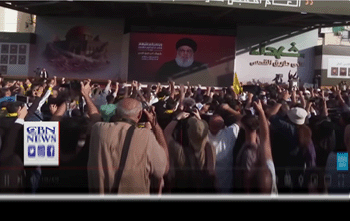11-09-2023 GARY LANE
The United States conducted airstrikes Wednesday on weapons warehouses in Syria after an Iranian proxy group launched six attacks against U.S. troops stationed at four bases in Iraq and Syria. The Iranian attacks were just the latest after dozens of strikes against American forces in the region.
On Monday, the Islamic Resistance in Iraq claimed responsibility for the attacks on U.S. bases, which have been ongoing since the start of the Gaza War. The IRI is among several Middle East militia groups that have joined Hamas in the fight against Israel and the United States.
While the U.S. has an expanded presence in the region, it has limited its military response over concerns of igniting a much bigger war.
The Iranian regime continues to wage war indirectly in the Middle East through a network of proxy militias.
It is all about plausible deniability. The Islamic regime can claim it is not behind or involved in these attacks, all the while calling for the death of the Zionists and America.
Knowing how far these Iranian tentacles reach throughout the region is important.
Among them are the Houthis, a tribe of Shiite Muslims out of Yemen. This homegrown militia calls itself Ansarulla, “The fighters of Allah.” Through Iranian support, the Houthis have greatly multiplied from about 2,000 armed fighters in 2005 to as many as 120,000 today.
Wednesday, a Pentagon official acknowledged the Houthis shot down a U.S. MQ-9 Reaper military drone off the coast of Yemen.
“Like Hamas, it depends on the Iranians for its military abilities, hardware, missiles, rockets, and weaponry,” explained Middle East Forum Research Director Jonathan Spyer. “The Houthis in Yemen are one of the clients that the Iranians like to switch on and off when they want to attack an enemy country without being held directly responsible for it themselves.”
In September 2019, Houthis launched a massive drone attack targeting the world’s largest oil processing facility in Saudi Arabia.
Since the October 7th attack, the Saudis, United Arab Emirates, and the United States have shot down Houthi missiles and drones headed for Israel.
A greater threat than this group comes from south Lebanon, where Hezbollah has more than 150,000 rockets ready to launch en masse against Israel.
Created and supported by the Iranian Revolutionary Guard, Hezbollah also controls the Lebanese government.
Last week, in a public speech, Hezbollah leader Hasan Nasrallah stopped short of announcing all-out war while indicating all options were on the table.
“Iran has yet to instruct Hezbollah to really plunge into total involvement in the war and open a second front,” said Spyer. “They’re trying to kind of distract attention from Israel with this drip of consistent attacks each day. ”
Spyer believes the presence of the USS Gerald Ford carrier strike group in the region, combined with Israeli military power, is currently deterring greater involvement.
“Israel has made clear if Hezbollah does enter the war, Israel will hit back against Lebanon with full force,” Spyer explained.
Further east, the little-known proxy group called the Islamic Resistance in Iraq (IRI) could potentially distract and ultimately pose a great threat to the United States.
Currently, 2,500 U.S. troops are stationed at bases in Iraq, with as many as 1,000 remaining in Syria. Their presence is designed to limit the influence of Russia and Iran in the region.
Over the past two weeks, the IRI has claimed responsibility for repeated attacks against those U.S. troops, including at least 23 missile strikes and multiple drone attacks. The IRI, formed in 2020, comprises members from various smaller, Iranian-backed militias. The group claimed responsibility for the Monday attacks against U.S. bases.
“It’s not really feasible or tenable for America to continue absorbing these hits,” Spyer insisted. “If America wants this to stop, the United States should take a little bit firmer action against these militias. At the end of the day, you know, these are acts are military acts. These are acts of war. …I think that it is not really acceptable that the United States Forces should be facing daily harassment. “
So far, the U.S. response has been limited to airstrikes in Syria on locations linked to Iran’s Revolutionary Guard.
Greater steps against these proxies or their boss could come in various forms, including more severe oil sanctions or even strikes inside Iran.
Military leaders, however, realize that either action could successfully result in deterrence or an escalation that possibly leads to a much bigger war.
